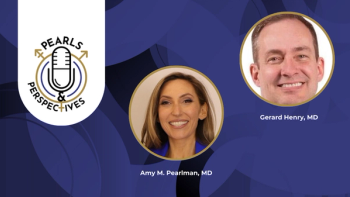
Justin Dubin, MD, on how direct-to-consumer men’s health companies can benefit patients
Key Takeaways
- DTC companies have destigmatized men's health issues, increasing awareness and education on sexual health topics.
- They provide access and anonymity for men lacking healthcare resources, but may not always be affordable or comprehensive.
"DTC companies, especially in the men's health space, have really done a wonderful job of destigmatizing conversations," says Justin Dubin, MD.
In this video, Justin Dubin, MD, discusses the potential benefits of direct-to-consumer (DTC) men’s health companies. Dubin is a urologist with Memorial Healthcare System in Aventura, Florida.
Transcription:
Are there specific conditions or circumstances where you would advise men to consult with a health care professional before using DTC products?
I personally think there are an incredible amount of benefits [with DTC companies]. First off, DTC companies, especially in the men's health space, have really done a wonderful job of destigmatizing conversations. You can't go anywhere anymore without seeing an ad on social media, on TV, on podcasts, for erectile dysfunction, low energy, low libido, ejaculatory problems. So to many degrees, they're doing the work that we need to be doing in terms of educating and destigmatizing these conversations. The other thing that they're able to do is they're able to provide access to people who may not be able to get access to health care issues, whether they're uninsured or they're not in an area that has a urologist or a provider. And they're able to provide that convenience and anonymity that a lot of people want, a lot of men want in the sexual health space.
Now, are they always doing what's best for the patient? Is it always affordable? I think in some ways, yes, in some ways, no. I think at the end of the day, direct-to-consumer is not an enemy. I think that we need to understand that they're here to stay, and as providers, we need to educate our patients on the risks and benefits of them. But one thing that I do think that we have to make sure, especially in the direct-to-consumer testosterone replacement, erectile dysfunction, sometimes these issues are not necessarily just an issue with your erections or your low testosterone. These things can be a sign or symptom of other things going on, whether it's diabetes, high blood pressure, heart disease, obesity, and I think it's important to educate men that just because you have 1 issue that you're treating with a medication doesn't mean that all of your problems are solved. We really need to educate men that this is 1 aspect of your health, but we may need to be checking other things. I can't tell you how many times that guys come in and I've diagnosed them with diabetes, high blood pressure, and they were just there for erections. And so I think direct-to-consumer is a great gateway for a lot of men to engage about their health for the first time, learn about their health for the first time, and hopefully be a stepping stone and motivational tool to have them come see us. And so I do think that we're able to access potentially more men by understanding direct-to-consumer, working hopefully with direct-to-consumer to really get our messages across. Because I think at the end of the day, the more men that are aware of their sexual health and that can at least start addressing it, the better for everyone.
This transcript was AI generated and edited by human editors for clarity.
Newsletter
Stay current with the latest urology news and practice-changing insights — sign up now for the essential updates every urologist needs.






